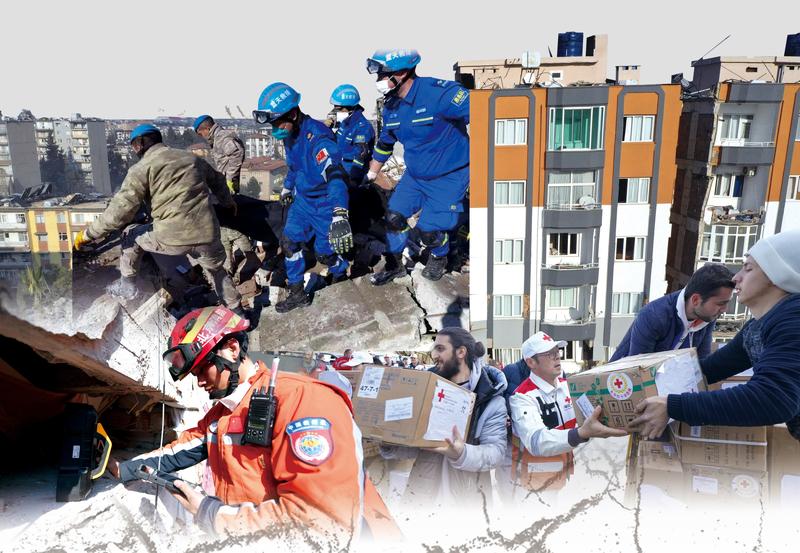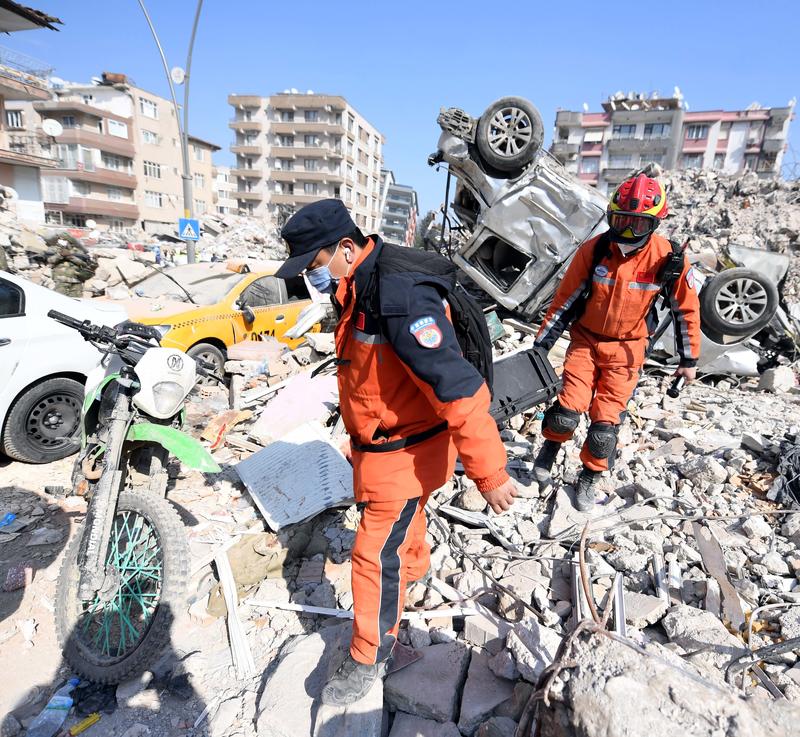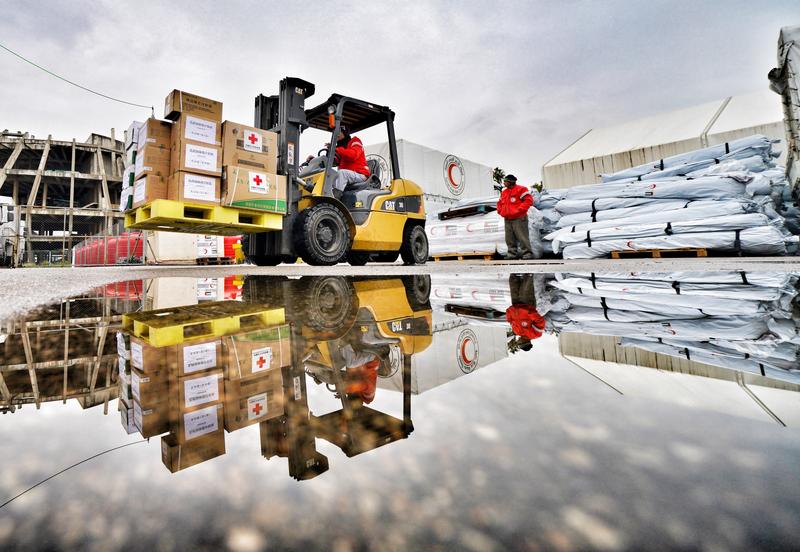Teams touched by support offered in Turkiye and from home
 Rescue teams and relief supplies from China arrive in Turkiye and Syria after devastating earthquakes struck both countries on Feb 6. (PHOTOS / TAO RAN / FOR CHINA DAILY / XINHUA / AP)
Rescue teams and relief supplies from China arrive in Turkiye and Syria after devastating earthquakes struck both countries on Feb 6. (PHOTOS / TAO RAN / FOR CHINA DAILY / XINHUA / AP)
When he learned that a magnitude 7.8 earthquake had hit Turkiye and Syria on Feb 6, Wang Kaibo was being involved in a charity activity sending oxygenators and health packs to elderly people living alone, as part of COVID-19 prevention work.
"My first reaction was that I needed to head home to pack my emergency equipment," said the 41-year-old from Xining, capital of Qinghai province, who is a member of Blue Sky Rescue, China's largest nongovernmental humanitarian organization.
"Since joining BSR 15 years ago, I have taken part in all its major operations, so I had to join this one," he said.
After an emergency consultation, 127 BSR members from throughout China assembled in two cities with direct flights to Turkiye — Wuhan, capital of Hubei province, and Guangzhou, capital of Guangdong province, and flew to the stricken country on Feb 8. Wang was one of about 60 members of the group who assembled in Wuhan.
China's official 82-strong rescue team arrived in Antakya, one of the cities worst affected by the quake, at 4:30 am local time that day.
A second quake of magnitude 7.5 struck nine hours after the first, bringing more devastation.
The official team was followed by more BSR members, rescuers from other Chinese civilian teams and people from local Chinese communities.
After arriving in Wuhan on Feb 7, Wang had two sleepless nights. As deputy commander of BSR's operation in Turkiye, the immediate task was preparation work for his team.
He obtained immigration documents and drew up a list of the equipment BSR members were carrying, and also started thinking about a work plan.
Wang was so busy in Wuhan that day, that for dinner he only ate two kebabs from a store he passed while going to buy thick clothing to combat freezing temperatures in Turkiye. He did not sleep that night.
He also had no time to rest during the 10-hour flight to Istanbul next day.
Access to in-flight Wi-Fi enabled him to communicate with other leaders of his team on the way to Turkiye to discuss the team's work plan, before arriving in Istanbul at 1 am local time on Thursday.
Soon after, the team flew to quake-hit Malatya, arriving in the city at 5 am. "We are racing against time," Wang said, adding that without any rest, the team members headed to an area assigned to them by the UN for rescue operations.
Reaching a school that acted as the team's base after a day of rescue operations on Friday, Wang immediately fell asleep on two desks he placed together.
He said that by noon Beijing time on Friday, BSR members had helped pull seven survivors and 78 bodies from the rubble. The team carried out search and rescue operations in 302 damaged buildings.
Despite his fatigue, Wang was touched by the support offered by local residents.
"No matter where we went and what time it was, people always came to provide us with food, including a type of flatbread, and tea," he said.
In a WeChat post, Yang Zhijian, member of a BSR branch from Chongqing, said the boss of a supermarket in Malatya refused to accept payment from him when he went to buy food for his teammates.
"I asked my interpreter to tell him I was not going to take anything if he didn't accept money. We don't take anything for free in China, let alone in a foreign country," the 35-year-old said in the post.
Yang took a photo with the boss at the latter's request before leaving.
 Rescue teams and relief supplies from China arrive in Turkiye and Syria after devastating earthquakes struck both countries on Feb 6. (PHOTO PROVIDED TO CHINA DAILY)
Rescue teams and relief supplies from China arrive in Turkiye and Syria after devastating earthquakes struck both countries on Feb 6. (PHOTO PROVIDED TO CHINA DAILY)
Moving sight
Wang and his colleagues were moved by the sight of a Turkish woman using her body heat to warm the hands of female BSR member Zhu Yanjun on Friday. Zhu is one of eight female members in Wang's 60-member squad.
Seeing Zhu, who comes from Hunan province, and her teammates joining the rescue operation over the remains of a flattened building, the woman, who was talking with some locals, pointed to the Chinese national flag on the rescuer's coat.
Speaking haltingly in English, Zhu, 50, said she was from China. After seeing the woman stretching out her hand, Zhu offered hers in return. On feeling Zhu's cold hand, the Turk extended her other hand to warm her.
"She then unzipped her coat and put my hands under her armpits," Zhu said, adding that the temperature at the time was minus 7 C.
Zhu, who learned from an interpreter that the woman's mother was buried under the rubble, left Malatya with her teammates for Adiyaman at 2 am on Saturday, and she doesn't know whether the mother has been found.
"It was a large pile of rubble, but I really hope there is miracle," she said.
Zhu's offer to help in Turkiye was initially rejected by leaders of BSR's Hunan branch.
"They needed young rescuers who are strong, especially those who have served in the army, but I was considered too old and to have poor physical ability," she said.
Zhu added that the branch leaders reluctantly agreed to send her to Turkiye after she pleaded with them repeatedly over the phone.
She said living conditions in the rescuers' camps were better than she expected.
"I thought we would have to sleep outdoors, but this was not the case, and we are being treated well by the local military and emergency management authorities," she said.
Although the building that acts as the team's camp was damaged by the quake, it was best that could be provided for accommodations. "There were plenty of blankets for us," Zhu said.
Despite the conditions and working constantly for more than 18 hours a day, she sleeps soundly during breaks between rescue operations. "There was an aftershock last night (Saturday) when I was sleeping, but I didn't feel it," Zhu said.
Green Boat Emergency Rescue, which is headquartered in Beijing, sent a five-member team to Turkiye on Feb 8.
Even though she did not accompany the team, Li Feng, head of the organization, has barely slept for more than four hours a day for the past few days, as she works as the squad's commander-in-chief.
With none of the five fluent in English, Li helps communicate with UN bodies and Turkiye's emergency management authority. In addition to risk assessment and decision-making, she spends a lot of time coordinating materials and equipment to support the team's rescue work.
Late on Sunday, Li said, "I haven't slept well for the past 72 hours, although I took sleeping pills every day."
She highlighted the support her team received when leaving Beijing for Istanbul.
The baggage exceeded the weight allowance by more than 200 kilograms. After learning that the team was heading to Turkiye for rescue operations, a male employee for China Southern Airlines at Beijing Daxing International Airport said there would be no charge for the excess baggage, Li said.
She asked the man for his name so that she could thank the airline, but he declined to give it.
"He said we were risking our lives to take part in the rescue operation at our own expense, and he was doing what he could to help," she said.
 Rescue teams and relief supplies from China arrive in Turkiye and Syria after devastating earthquakes struck both countries on Feb 6. (PHOTO PROVIDED TO CHINA DAILY)
Rescue teams and relief supplies from China arrive in Turkiye and Syria after devastating earthquakes struck both countries on Feb 6. (PHOTO PROVIDED TO CHINA DAILY)
Generators provided
Li's team was also helped by the provision of two electric generators thanks to a Chinese entrepreneur.
After learning that the Green Boat team was heading to Turkiye, the entrepreneur, surnamed Yang, asked Li if generators were needed for the mission.
Yang, who runs Baisheng, an emergency equipment company in Shenyang, capital of Liaoning province, did not travel to Turkiye. Instead, he contacted a friend in the quake-hit nation for help, before finally managing to send the generators from Istanbul to the Green Boat team's base in Hatay province, Li said.
She added that Yang's friend planned to hand the generators to the team at the airport in Istanbul, but the squad flew to Hatay directly without leaving the airport.
"Soon after I told him the generators had been received, Yang sent me a WeChat account with the contact details of a technician who could help if there were any problems with the equipment." Li said.
"I am greatly moved by this generosity," she said, adding that the generators provide power for more than 60 workers from five Chinese rescue organizations.
Many Chinese studying and working in Turkiye have also contributed to the disaster relief operation.
For example, Ma Jiayao, 30, from Qinghai, who went to study at Istanbul University in 2014 and has worked in Turkiye since graduating, volunteered to work as an interpreter for Chinese rescuers.
"I was very excited when I saw on the news that Chinese rescuers had arrived in Turkiye," Ma said.
Xihai Metropolis Daily in Xining quoted him as saying, "After hearing from a friend that our embassy in Turkiye was arranging for Chinese students in the country to work as interpreters for Chinese rescuers, the appeal received an immediate response, and I wanted to sign up to help."
As many Chinese in Turkiye were eager to contribute to rescue work, Ma feared his application would not receive a quick response, so he contacted Chinese journalists heading to areas hit by the quake so that they could try to reach Chinese rescuers together.
Leaving Istanbul Airport for Malatya province on Thursday in a rental car with the journalists, Ma finally reached the Blue Sky Rescue camp shortly before midnight on Friday, where he quickly started interpreting for the Chinese rescuers.
As of Tuesday afternoon Beijing time, 440 members from 17 Chinese civilian rescue teams had reached quake-hit areas of Turkiye, according to China's Ministry of Emergency Management.
According to an earlier release from the ministry, as of May 12, 2021, China's National Disaster Prevention and Reduction Day, 1,775 civilian rescue teams comprising 620,000 members were registered in China.
The Emergency Response Coordination Center for Chinese NGOs in Turkiye said it stopped accepting civilian rescuers from China at 3 pm on Sunday.
With emergency search and rescue operations coming to an end, and the priority of disaster relief work shifting to resettlement, the center urged Chinese civilian teams not to travel to Turkiye.
It said it wants to see rescue teams that have completed their tasks make an orderly departure from the country.
Some teams have already decided to leave Turkiye. For example, seven members from the BSR branch in Baoding, Hebei province, were poised to return to China on Tuesday.
Bai Haiyan, head of the group, said on Monday: "Today, we will again comb areas where there are suspected signs of survivors. Tomorrow, the Baoding BSR group will start to leave. Every time we go to disaster-stricken areas, we assemble rapidly. After completing the task, we leave quietly.
"When we arrived in Turkiye, we shouted the slogan 'Live up to our mission, and come back safe and sound'."
Zhang Yu, Gu Yehua contributed to this story.


